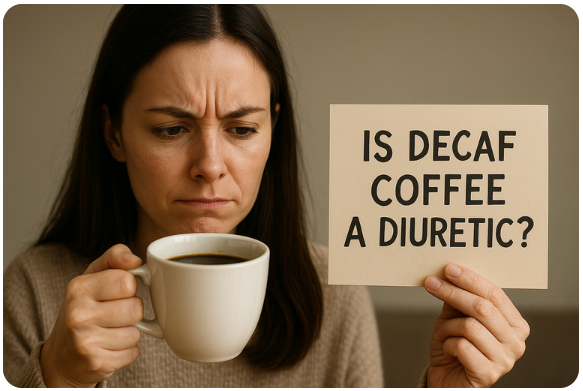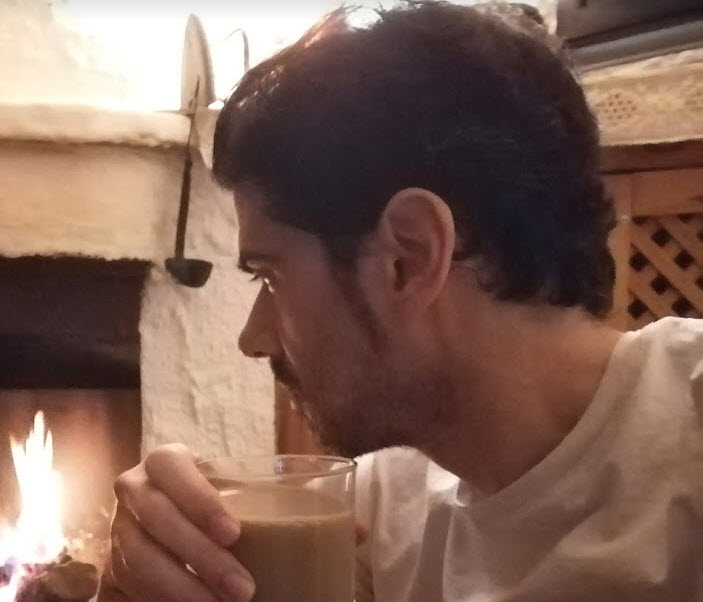No, decaf coffee is not considered a diuretic in any meaningful way for most people.
While regular coffee’s caffeine content can have a mild diuretic effect, decaf coffee contains very little caffeine, typically between 2 to 5 mg per cup, and therefore does not significantly increase urine output, according to some sources.
In fact, decaf coffee can be a good way to increase fluid intake and contribute to daily hydration needs, according to some sources.
According to the Mayo Clinic, moderate caffeine intake doesn’t cause fluid loss in excess of fluid consumed. With decaf, the caffeine content is so low that the diuretic impact is, for most, negligible to nonexistent.
For specifics, use our Decaf Caffeine Ratio Calculator to compare your brand’s decaf with standard brews.
Key Takeaways
- Decaf coffee contains very little caffeine (2–5 mg per cup), making its diuretic effect negligible.
- It contributes to hydration and doesn’t cause fluid loss beyond what’s consumed.
- Decaf is safe for most people, including those with kidney sensitivity.
- If you notice more frequent urination, it’s likely due to fluid volume or warmth, not the coffee itself.
- Most people can drink decaf before bed without increased nighttime bathroom trips.
Contents
- Does Decaf Coffee Contribute to Hydration?
- What About Decaf and Kidney Function?
- Can You Drink Decaf Coffee Before Bed Without Nighttime Bathroom Trips?
- Does Decaf Coffee Affect Electrolytes or Cause Imbalance?
- So Why Do Some People Say They Pee More After Drinking Decaf?
- How to Know If Your Coffee Is Making You Go to the Bathroom More
- Diuretic-Related Frequently Asked Questions
Does Decaf Coffee Contribute to Hydration?
Yes, it does.
Decaf coffee is more than 98% water. Unless you’re consuming multiple liters at once (don’t), it helps maintain hydration like any other water-based beverage. There’s no solid evidence that decaf coffee causes dehydration, even with regular consumption.
This makes decaf a great option if you want the ritual of coffee without worrying about water balance, especially in the afternoon or evening.
What About Decaf and Kidney Function?
For healthy individuals, decaf is kidney-safe.
There’s no indication that decaf causes stress to kidneys in the way that excessive caffeine or certain supplements might. In fact, for people sensitive to caffeine, decaf can be a supportive choice that avoids elevating blood pressure or increasing renal workload.
As always, if you have kidney disease or specific health conditions, check with a healthcare provider.
Can You Drink Decaf Coffee Before Bed Without Nighttime Bathroom Trips?
Most people can.
Unless you’re drinking large amounts of any fluid before bed, a standard cup of decaf won’t typically increase nighttime urination. Again, the caffeine levels are too low to matter, and most of the fluid is absorbed slowly.
If you’re unsure how your decaf compares to others, our decaf caffeine calculator can help clarify the caffeine content by brand or roast type.
Does Decaf Coffee Affect Electrolytes or Cause Imbalance?
Not under normal consumption.
Drinking moderate amounts of decaf won’t significantly impact electrolyte levels. Unless you have a condition that affects sodium or potassium regulation, you don’t need to worry about drinking decaf the same way you might monitor diuretic medications.
So Why Do Some People Say They Pee More After Drinking Decaf?
Sometimes it’s just volume or temperature.
Hot beverages can stimulate digestion and trigger natural reflexes that involve the bladder. The act of drinking itself (especially large or frequent cups) can result in more trips to the bathroom but not because the drink is diuretic, but because it’s hydrating and warming. That’s a digestive response, not a chemical one.
How to Know If Your Coffee Is Making You Go to the Bathroom More
Track your timing and compare it to other beverages.
The best way to determine if your coffee (decaf or not) is causing increased urination is to observe patterns:
- Are you needing to urinate within 20–30 minutes of drinking coffee consistently?
- Does this happen with water or other fluids too?
- Do you notice more urgency or volume than usual?
Keep a short diary for a couple of days and compare it with your typical fluid intake. If only coffee causes it (and not equivalent amounts of tea or water), then it might be having a mild diuretic effect. Or simply acting as a warm liquid that stimulates digestion. Hydration level, time of day, and individual bladder sensitivity also play a role.
1. Does decaf coffee make you dehydrated?
No. Decaf coffee is mostly water and contributes to hydration.
2. How much caffeine is in decaf coffee?
Most decaf contains between 2–5 mg of caffeine per 8 oz cup, compared to 70–140 mg in regular coffee.
3. Can decaf coffee make you urinate more?
Possibly. But mostly due to fluid volume and temperature, not diuretic effects.
4. Is decaf safe for people with kidney issues?
Generally yes, but consult your doctor for individual guidance.
5. Can you drink decaf coffee while fasting?
Yes. It contains negligible calories and doesn’t disrupt most intermittent fasting protocols.
6. How can I compare caffeine levels in different decaf coffees?
Use our Decaf Caffeine Ratio Calculator to get precise data by brand or method.


